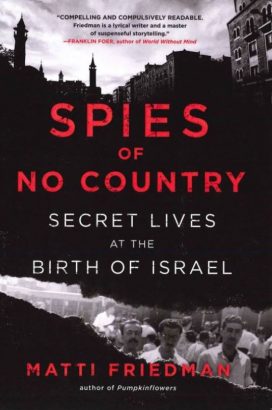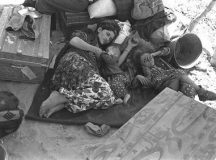Journalist and author Matti Friedman talks to Fathom Deputy Editor Calev Ben-Dor about his acclaimed recent book, Spies of No Country which tells the little known story of the origins of Israeli intelligence by following four of Israel’s first spies through the 1948 War of Independence. He also discusses the importance of the ‘Mizrachi’ component in Israel’s identity, arguing that without grasping its centrality, neither Israelis, Westerners nor those in the Arab world can properly understand the country. Download a PDF version here.
Framing a 21st Century Zionist Story
Calev Ben-Dor (CB-D): Your new book Spies of No Country tells the story of four young Jewish men from the Arab world who form the beginnings of Israel’s spy network. What drove you to focus on this?
Matti Friedman (MF): The book follows four of Israel’s first spies through the 1948 War of Independence. The main characters are young men on the margins of the Zionist project who are recruited by a small, ad-hoc intelligence outfit within the Palmach called the Arab Section, which encourages Arabic-speaking Jews to cross enemy lines and gather intelligence in the Arab world. They actually don’t call themselves agents, but Mistarvim, which means ‘ones who become like Arabs’ and it’s a term used today, made famous by the TV hit Fauda. At its height at the onset of the war, the section was no more than 20 agents, only half of whom survive. Their mission expanded to attempted assassinations of Arab leaders, and in Haifa they carried out a pre-emptive attack on a garage where the Arab militia was preparing a car bomb in the spring of 1948. And then when Haifa fell to the Haganah in 1948 and the Arabs begun to flee, the people in charge of the Arab Section realised that they have an opportunity to insert their agents into the Arab world by disguising them as refugees. They ran away to Lebanon and spent the first two years of Israel’s existence as Palestinian refugees, so the way they experienced the birth of the state is radically different to most of the stories people have heard about at that time.
For many years, I have had the feeling that the stories we tell about Israel no longer explain the country; nor are they useful as a map for navigating the country in 2019. Israel has always told its story in a very European way, about socialism, Theodor Herzl, the Holocaust, the Kibbutzim. That is very important if you want to understand how the country was founded, but it doesn’t explain the society that we live in. So I was looking for other stories that would explain the state of now, particularly from the Middle Eastern perspective, which reflects the fact that half of Israelis today actually come from the Islamic world rather than from Europe. In 2011 I met a 90-year-old former spy, Isaac Shoshan, who lives in a small working class suburb of Tel Aviv with whom I had a series of fascinating conversations. Isaac told me a story about the founding of the state that I hadn’t heard before. He experienced 1948 as a Palestinian refugee, which was his job as part of the very small, embryonic intelligence outfit that as part of the Jewish military underground and that story struck me as worth telling.
CB-D: I recently interviewed Yossi Klein Halevi about his book, Letters to my Palestinian Neighbour and one of the things he emphasised was how he wanted to tell a 21st century Zionist story. You touched on this earlier, in that the story often told is overly Euro-centric – the narrative begins with the pogroms in Russia and ends with the Holocaust. Your book, which is different in many ways, has a similar idea in that if we are to tell the story of Israel today – both to Israelis and outsiders – we need to make it more accurate to include a Mizrachi component.
MF: People still tell the story of Israel as: When the Jews of the Islamic world moved to Israel they joined the story of the Ashkenazim – so the story of Israel is the story of the Jews of Europe. But having thought about this, and having lived here for 23 years, it is clear to me that what actually happened is much closer to the opposite. The remnants of the Jews of Europe come to the Middle East and inserted themselves into the story of the Jews of the Islamic world. The State of Israel is shaped by our contact with Islam and Jews who have lived here for centuries. The dominant narrative of the European Jews is wrong.
Looking ahead, telling Israel’s story in the 21st century will have a lot less to do with the Warsaw Ghetto than it will with Kurdistan and Aleppo. And Western observers find that difficult. But if we want to understand Israel, we are going to have to make an effort to move our centre of consciousness to the Middle East because that’s where we are.
Identity, Ethnic Impersonation and the British Origins of Israeli Spies
CB-D: One thing that surprised me was the fact the origins to this type of spying are actually British. You describe how during the Second World War there are British officials teaching Jews and others of how to exist behind enemy lines. What is that story?
MF: The roots of the Arab Section lie with the British. The original idea was not to fight the Arab world, but the Germans. In the early years of the Second World War, when it looked like the German army was about to enter Mandatory Palestine through North Africa, the British and Jewish community in Palestine have a shared sense of panic. They realise they face real danger and plans are drawn up for a last defence of Haifa. You can actually still see maps that reflect the idea of a Masada-esque defence on Mount Carmel.
Alongside those efforts, the British began using Jews as intelligence agents. The British Special Operations Executive (SOE), which set up shop in Palestine around the same time, had experience of working around the Mediterranean and many of the SOE guys were active in Greece and Crete. If you read their memoirs you actually see how bad they were at fitting in with the local population. They were basically upper-class British men recruited because they knew a bit of Greek and were then parachuted in German-occupied Crete. But while their Greek may have been good enough to fool a German soldier at a checkpoint it wasn’t good enough to fool the Greeks.
The British understood how hard it was to assume an ethnic identity. They realised that even if you successfully learn a language and study the customs, your chances of fooling a local are slim. While searching for people who could fool the locals they discovered in Palestine they had a Jewish population that came from across the world, who could pass perfectly for dozens of nationalities and they made use of it.
One of the first things the British did was to set up ‘The German Section,’ comprised of German Jews who were supposed to pass as German soldiers were the Germans to invade Palestine. There are incredible accounts of these men training in German uniforms and signing Nazi songs. At the same time they needed people who could pass in the Arab world, which was pro-German in orientation and which was expected to fall behind German lines quite soon. This is how the Arab Section is born, and it is populated with Jews from Arab countries. Some of the most important roots of the Mossad lie with the British SOE in 1941.
CB-D: In the book, you ask, ‘What does this identity mean?’ Were they really ‘becoming like Arabs’ [mistarvim], or were they already Arabs? Were they pretending to be Arabs, or were they pretending to be people who weren’t Arabs pretending to be Arabs? Can you expand of this question of identity?
MF: If you take the German Section as an example, you have Jews who were in fact Germans – they didn’t have to be taught the language or know the culture – and only people like that would have a shot at passing as a spy. Ethnic impersonation cannot be taught.
The same applies to the Arab Section. The question, ‘to what extent are they becoming like Arabs?’ is an interesting one. Are they assuming a false identity or is it simply their identity? If you’re a Jew from Syria, your native tongue is Arabic, your native culture is Arab, and your family have lived for several generations in the Arab world, the extent to which this is a false identity is perhaps one of the most interesting tensions in the story of the book. And maybe one of the most important tensions in the whole country is half of the Jewish population comes from the Arab world. They’re connection is very deep and complicated and the binary idea that Jews are one thing, Arabs are another is not accurate.
How Mizrachi historical experience shapes Israel
CB-D: Something that struck me while reading is the how the story of the Jews from Arab lands end. You remind readers that these Jews had survived a lot of crises – they had been present before the conquest of Islam, and even before the destruction of the Second Temple in 70 CE. There is nothing inherently to suggest that they shouldn’t also have been able to survive the establishment of the State of Israel. Yet now, when we look back, we see it as inevitable that they would not be able to continue to live in the Arab world. But in 1947, for the heroes of the story, it was far from clear that we were approaching the end of Jewish presence in Arab lands after 2,000 years?
MF: In 2019 it is clear to us that if the state of Israel exists then the Jewish presence in the Arab world isn’t going to exist. This was a world of about a million people in the 1940s – almost every major Arab city has a Jewish quarter, with some estimates putting the Jewish population of Baghdad as a third. The idea that this was going to suddenly disappear at the time was crazy. And we should remind ourselves of the fact that it did vanish is crazy. If you grow up in a Western Jewish community you’re very much aware of the loss stemming from the Holocaust, but less aware and appreciative of the loss of the smaller and much older Jewish world in the Middle East, which was alive and well into the 1940s.
The remnants of that world are largely here in Israel and they and their experiences are a very important part of the life of the country. It’s one of the things that makes this county different to a Western Jewish community, and why Westerners sometimes who struggle to get their heads around the country. These spies are a way of talking about all of that. They see it collapse. When they leave Palestine in 1947, they still see that world intact, but when they return to the State of Israel in the 1950s that world is doomed. That collapse of that world has both incredible significance for the Middle East and huge impact on the development of the State of Israel.
The Arab Muslim world erroneously views Israel as a Western implant
CB-D: In addition to Israelis and Westerners having to shift their perception about Israeli society, there is a third component you mention in your book that needs to be shifted, namely those within the Arab/Muslim world who view Israel as a Western implant rather than a country populated by people indigenous to the region. You talk about a mural in Egypt showing Egyptian soldiers crossing the Suez Canal in 1973 and facing blond Israeli soldiers. You point out that Israelis are generally not blonde, but it helped the Arab world to see Israel as a European story.
MF: There are two main reasons why the Arab world has tried so hard to portray Israel as a colonialist implant: the first is that it help plays on European guilt for what happened in the Second World War; the second is that it obscures their own responsibility for why over 800,000 Jews, most of whom came to Israel, lost their homes in the Islamic world. Once you understand what happened, you will have a lot of criticism of Arab states for what drove out the Jewish population, so in order to make that go away, the Israelis have to be portrayed as blonde. Rather than blonds, many of those soldiers fighting the Egyptians on the Suez Canal looked like Egyptians (in fact some were originally from Egypt). So this a purposeful attempt by the Muslim world to erase that history, which suggest their own culpability in this story.
Contemporary Mizrachi Identity in Israel
CB-D: You have written a lot about how so-called Mizrachi identity is becoming more central in Israel. Can you expand on how these components are shaping Israeli identity?
MF: It is important to say that the word Mizrachi is such a generalisation that I try to use it as little as I can. It means ‘Eastern’ in Hebrew, but what it has come to include is anyone who came to Israel from the Islamic world, which incorporates a vast array of countries from Afghanistan to Morocco, (which is actually farther west than London). So calling them ‘Eastern’ is very problematic. But yes, the Jews of the Muslim world have a great deal to offer and it’s interesting to see the way Israel is being naturally being shaped by that world. For example, the Judaism practiced in Israel is a very ‘Middle-Eastern’ style of Judaism. In Europe, for example, it’s always been accepted to talk about religious and secular, but that difference has never been accepted in the Jewish world in the Middle East, and this is increasingly the case in Israel too. There is no option other than living inside tradition. But inside tradition itself there is a lot of flexibility – so one might go to synagogue, make Kiddush, and then go to a soccer game. It is that fluid Jewish identity which is much deeper in Middle Eastern Jewish societies.
I also think our politics have largely been shaped by being a minority in the Islamic world. Foreigners have often assumed that Israel has moved to the Right because of the settler movement, but this is incorrect – the settler movement has always been a small minority. What really drives the shift has been the memory of what it means to be a minority in the Islamic world and the threat that poses to those who are weak.
We’ve seen this threat to minorities in the last decade especially, and Israelis experienced it themselves between 2000-2004 during the Second Intifada, and the people who were surprised by this shift are more likely to come from Europe than from the Middle East. Although Israelis have always been sceptical about what the Arab world holds in store for us, one has to accept that if you have families that have lived in this part of the world for centuries and have been forced to leave, they have wisdom that the rest of us would be wise to listen to and not to dismiss.





































Excited for the March 5th Kindle release date. Great author and an amazing topic. TY Fathom for a fascinating interview.
Big fan of Matti and eager to get hold of ” Spies of No Country ” but disappointed he will not be present at JBW in London